
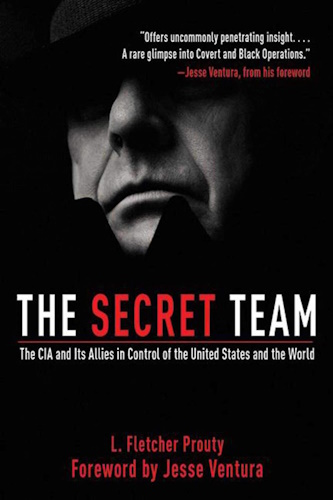
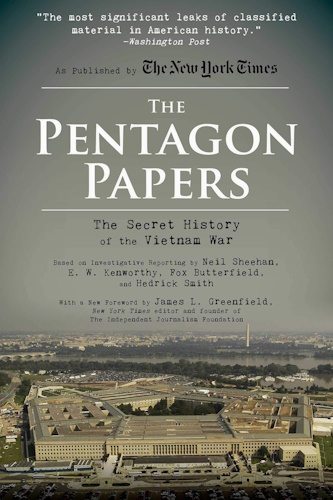

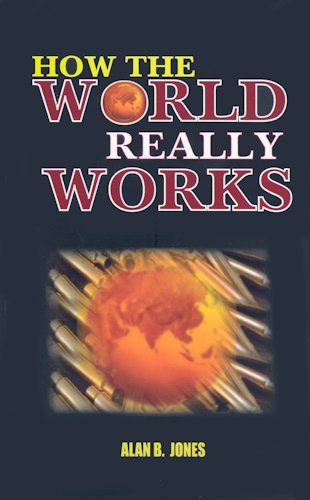

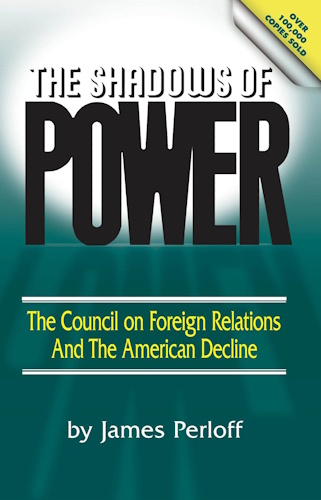

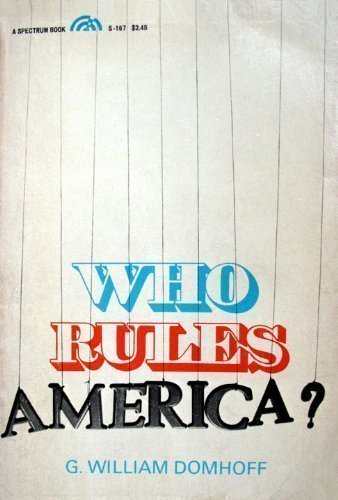

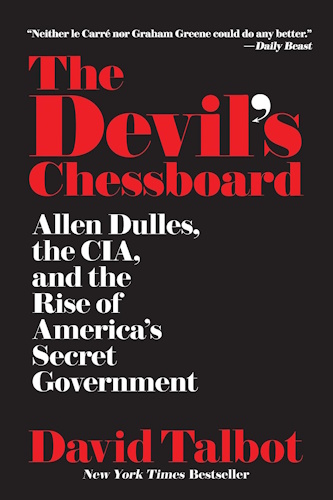
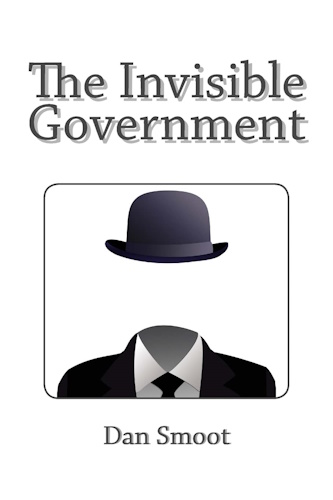

![]()
![]()
APPENDICES:
II. Powers and Duties of the CIA
U.S. Title 50 -- War and National Defense, Chapter 15 -- National Security contains, in one place, a collation of most of the law as it pertains to the Central Intelligence Agency. Most people who write about the CIA and who talk about the CIA -- indeed, many who have served with the CIA -- have never read this law. It is most significant that the legislation that pertains to war and national defense is the same legislation that includes all reference to the CIA. It is almost as if the bomb contained its own live fuse or the gun came with the trigger cocked for action. As we have seen, during the past twenty-five years the CIA has become the active agent that ignites the military establishment whenever that great mass becomes supercritical.
Fundamental to the whole concept and character of the CIA is the statement of the five powers and duties, which appears in Section 403 (d). This is a precise, clear, and unequivocal delineation of what Congress and the President wanted the Central Intelligence Agency to be. The language of the law has never been substantively altered; yet in practice the CIA and its Secret Team mentors have changed it beyond recognition. (This appendix includes all important material relevant to the CIA from the National Security Act.)
§ 401. Congressional declaration of purpose.
In enacting this legislation, it is the intent of Congress to provide a comprehensive program for the future security of the United States; to provide for the establishment of integrated policies and procedures for the departments, agencies, and functions of the Government relating to the national security; to provide a Department of Defense, including the three military Departments of the Army, the Navy (including naval aviation and the United States Marine Corps), and the Air Force under the direction, authority, and control of the Secretary of Defense; to provide that each military department shall be separately organized under its own Secretary and shall function under the direction, authority, and control of the Secretary of Defense; to provide for their unified direction under civilian control of the Secretary of Defense, but not to merge these departments or services; to provide for the establishment of unified or specified combatant commands, and a clear and direct line of command to such commands; to eliminate unnecessary duplication in the Department of Defense, and particularly in the field of research and engineering by vesting its overall direction and control in the Secretary of Defense; to provide more effective, efficient, and economical administration in the Department of Defense; to provide for the unified strategic direction of the combatant forces, for their operation under unified command, and for their integration into an efficient team of land, naval, and air forces but not to establish a single Chief of Staff over the armed forces nor an overall armed forces general staff. (July 6, 1947, ch. 343, § 2, 61 Stat. 496; Aug. 10, 1949, ch. 412, § 2, 63 Stat. 579; Aug 6, 1958, Pub. L. 85-599, § 2, 72 Stat. 514)
§ 402. National Security Council.
(a) Establishment, presiding officer; functions, composition.
There is established a council to be known as the National Security Council (hereinafter in this section referred to as the "Council").
The President of the United States shall preside over meetings of the Council: Provided, That in his absence he may designate a member of the Council to preside in his place.
The function of the Council shall be to advise the President with respect to the integration of domestic, foreign, and military policies relating to the national security so as to enable the military services and the other departments and agencies of the Government to cooperate more effectively in matters involving the national security.
The Council shall be composed of --
(1) the President;
(2) the Vice President;
(3) the Secretary of State;
(4) the Secretary of Defense;
(5) the Director for Mutual Security;
(6) The Chairman of the National Security Resources Board; and
(7) the Secretaries and Under Secretaries of other executive departments and of the military departments, the Chairman of the Munitions Board, and the Chairman of the Research and Development Board, when appointed by the President by and with the advice and consent of the Senate, to serve at his pleasure.
(b) Additional functions.
In addition to performing such other functions as the President may direct, for the purpose of more effectively coordinating the policies and functions of the departments and agencies of the Government relating to the national security, it shall, subject to the direction of the President, be the duty of the Council --
(1) to assess and appraise the objectives, commitments, and risks of the United States in relation to our actual and potential military power, in the interest of national security, for the purpose of making recommendations to the President in connection therewith; and
(2) to consider policies on matters of common interest to the departments and agencies of the Government concerned with the national security, and to make recommendations to the President in connection therewith.
(c) Executive secretary; appointment and compensation; staff employees.
The Council shall have a staff to be headed by a civilian executive secretary who shall be appointed by the President. The executive secretary, subject to the direction of the Council, is authorized, subject to the civil-service laws and chapter 51 and subchapter III of chapter 53 of title %, to appoint and fix the compensation of such personnel as may be necessary to perform such duties as may be prescribed by the Council in connection with the performance of its functions.
(d) Recommendations and reports.
The Council shall, from time to time, make such recommendations, and such other reports to the President as it deems appropriate or as the President may require. (July 6, 1947, ch. 343, title I, § 101, 61 Stat. 497; Aug. 10, 1949, ch. 412, § 3, 63 Stat. 579; Oct. 28, 1949, ch. 782, title XI, § 1106 (a), 63 Stat. 972; Oct. 10, 1951, ch. 479, title V, § 501 (e) (1), 65 Stat. 378.)
1949 -- Subsec. (a) Act Aug. 10, 1949, added the Vice President to the Council, removed the Secretaries of the military departments, to authorize the President to add, with the consent of the Senate, Secretaries and Under Secretaries of other executive departments, to authorize the President to add, with the consent of the Senate, Secretaries and Under Secretaries of other executive departments and of the military department, and the Chairmen of the Munitions Board and the Research and Development Board.
The National Security Council, together with its functions, records, property, personnel, and unexpended balances of appropriations, allocations, and other funds (available or to be made available) were transferred to the Executive Office of the President by 1949 Reorg. Plan No. 4, eff. Aug. 19, 1949, 14 F.R. 5227, 63 Stat. 1067, set out in the Appendix to Title 5, Government Organization and Employees.
§ 403. Central Intelligence Agency.
(a) Establishment; Director and Deputy Director; appointment.
There is established under the National Security Council a Central Intelligence Agency with a Director of Central Intelligence who shall be the head thereof, and with a Deputy Director of Central Intelligence who shall act for, and exercise the powers of, the Director during his absence or disability. The Director and the Deputy Director shall be appointed by the President, by and with the advice and consent of the Senate, from among the commissioned officers of the armed services, whether in an active or retired status, or from among individuals in civilian life: Provided, however, That at no time shall the two positions of the Director and Deputy Director be occupied simultaneously by commissioned officers of the armed services, whether in active or retired status.
(b) Commissioned officer as Director or Deputy Director; powers and limitations, effect on commissioned status.
(1) If a commissioned officer of the armed services is appointed as Director, or Deputy Director, then --
(A) in the performance of his duties as Director, or Deputy Director, he shall be subject to no supervision, control, restriction, or prohibition (military or otherwise) other than would be operative with respect to him if he were a civilian in no way connected with the Department of the Army, the Department of the Navy, the Department of the Air Force, or the armed services or any component thereof; and
(B) he shall not possess or exercise any supervision, control, powers, or functions (other than such as he possesses, or is authorized or directed to exercise, as Director, or Deputy Director) with respect to the armed services or any component thereof, the Department of the Army, the Department of the Navy, or the Department of the Air Force, or any branch, bureau, unit, or division thereof, or with respect to any of the personnel (military or civilian) of any of the foregoing.
(2) Except as provided in paragraph (1) of this subsection, the appointment to the office of Director, or Deputy Director, of a commissioned officer of the armed services, and his acceptance of and service in such office, shall in no way affect any status, office, rank, or grade he may occupy or hold in the armed services, or any emolument, perquisite, right, privilege, or benefit incident to or arising out of any such status, office, rank, or grade. Any such commissioned officer shall, while serving in the office of Director, or Deputy Director, continue to hold rank and grade not lower than that in which serving at the time of his appointment and to receive the military pay and allowances (active or retired, as the case may be, including personal money allowance) payable to a commissioned officer of his grade and length of service for which the appropriate department shall be reimbursed from any funds available to defray the expenses of the Central Intelligence Agency. He also shall be paid by the Central Intelligence Agency from such funds an annual compensation at a rate equal to the amount by which the compensation established for such position exceeds the amount of his annual military pay and allowances.
(3) The rank or grade of any such commissioned officer shall, during the period in which such commissioned officer occupies the office of Director of Central Intelligence, or Deputy Director of Central Intelligence, be in addition to the numbers and percentages otherwise authorized and appropriated for the armed service of which he is a member.
(c) Termination of employment of officers and employees; effect on right of subsequent employment.
Notwithstanding the provisions of section 652 of Title 5, or the provisions of any other law, the Director of Central Intelligence may, in his discretion, terminate the employment of any officer or employee of the Agency whenever he shall deem such termination necessary or advisable in the interests of the United States, but such termination shall not affect the right of such officer or employee to seek or accept employment in any other department or agency of the Government if declared eligible for such employment by the United States Civil Service Commission.
For the purpose of coordinating the intelligence activities of the several Government departments and agencies in the interest of national security, it shall be the duty of the Agency, under the direction of the National Security Council --
(1) to advise the National Security Council in matters concerning such intelligence activities of the Government departments and agencies as relate to national security;
(2) to make recommendations to the National Security Council for the coordination of such intelligence activities of the departments and agencies of the Government as relate to the national security;
(3) to correlate and evaluate intelligence relating to the national security, and provide for the appropriate dissemination of such intelligence within the Government using where appropriate existing agencies and facilities: Provided, That the Agency shall have no police, subpoena, law-enforcement powers, or internal-security functions: Provided further, That the departments and other agencies of the Government shall continue to collect, evaluate, correlate, and disseminate departmental intelligence: And provided further, That the Director of Central Intelligence shall be responsible for protecting intelligence sources and methods from unauthorized disclosure;
(4) to perform, for the benefit of the existing intelligence agencies, such additional services of common concern as the National Security Council determines can be more efficiently accomplished centrally;
(5) to perform such other functions and duties related to intelligence affecting the national security as the National Security Council may from time to time direct.
(e) Inspection of intelligence of other departments.
To the extent recommended by the National Security Council and approved by the President, such intelligence of the departments and agencies of the Government, except as hereinafter provided, relating to the national security shall be open to the inspection of the Director of Central Intelligence, and such intelligence as relates to the national security and is possessed by such departments and other agencies of the Government, except as hereinafter provided, shall be made available to the Director of Central Intelligence for correlation, evaluation, and dissemination: Provided, however, That upon the written request of the Director of Central Intelligence, the Director of the Federal Bureau of Investigation shall make available to the Director of Central Intelligence such information for correlation, evaluation, and dissemination as may be essential to the national security.
(f) Termination of National Intelligence Authority; transfer of personnel, property, records, and unexpended funds.
Effective when the Director first appointed under subsection (a) of this section has taken office --
(1) the National Intelligence Authority (11 Fed. Reg. 1337, 1339, February 5, 1946) shall cease to exist; and
(2) the personnel, property, and records of the Central Intelligence Group are transferred to the Central Intelligence Agency, and such Group shall cease to exist. Any unexpended balances of appropriations, allocations, or other funds available or authorized to be made available for such Group shall be available and shall be authorized to be made available in like manner for expenditure by the Agency.
(July 26, 1947, ch. 343, title I, § 102, 61 Stat. 498; Apr. 4, 1953, ch. 16, 67 Stat. 20.)
EX. ORD. NO. 11460. PRESIDENTS FOREIGN INTELLIGENCE
ADVISORY BOARD
Ex. Ord. No. 11460, Mar. 20, 1969, 34 F.R. 5535, provided:
By virtue of the authority vested in me as President of the United States, it is ordered as follows:
SECTION 1. There is hereby established the Presidents Foreign Intelligence Advisory Board, hereinafter referred to as "the Board". The Board shall:
(1) advise the President concerning the objectives, conduct, management and coordination of the various activities making up the overall national intelligence effort;
(2) conduct a continuing review and assessment of foreign intelligence and related activities in which the Central Intelligence Agency and other Government departments and agencies are engaged;
(3) receive, consider and take appropriate action with respect to matters identified to the Board, by the Central Intelligence Agency and other Government departments and agencies of the intelligence community, in which the support of the Board will further the effectiveness of the national intelligence effort; and
(4) report to the President concerning the Boards findings and appraisals, and make appropriate recommendations for actions to achieve increased effectiveness of the Governments foreign intelligence effort in meeting national intelligence needs.
SEC. 2. In order to facilitate performance of the Boards functions, the Director of Central Intelligence and the heads of all other departments and agencies shall make available to the Board all information with respect to foreign intelligence and related matters which the Board may require for the purpose of carrying out its responsibilities to the President in accordance with the terms of this Order. Such information made available to the Board shall be given all necessary security protection in accordance with the terms and provisions of applicable laws and regulations.
SEC. 3. Members of the Board shall be appointed by the President from among persons outside the Government, qualified on the basis of knowledge and experience in matters relating to the national defense and security, or possessing other knowledge and abilities which may be expected to contribute to the effective performance of the Boards duties. The members of the Board shall receive such compensation and allowances, consonant with law, as may be prescribed hereafter.
SEC. 4. The Board shall have a staff headed by an Executive Secretary, who shall be appointed by the President and shall receive such compensation and allowances, consonant with law, as may be prescribed by the Board. The Executive Secretary shall be authorized, subject to the approval of the Board and consonant with law, to appoint and fix the compensation of such personnel as may be necessary for performance of the Boards duties.
SEC. 5. Compensation and allowances of the Board, the Executive Secretary, and members of the staff, together with other expenses arising in connection with the work of the Board, shall be paid from the appropriation appearing under the heading "Special Projects" in the Executive Office Appropriation Act, 1969, Public Law 90-350, 82 Stat. 195, and, to the extent permitted by law, from any corresponding appropriation which may be made for subsequent years. Such payments shall be made without regard to the provisions of section 3681 of the Revised Statues and section 9 of the Act of March 4, 1909, 35 Stat. 1027 (31 U.S.C. 672 and 673)
SEC. 6. Executive Order No. 10938 of May 4, 1961, is hereby revoked.
RICHARD NIXON.
SHORT TITLE
Act June 20, 1949, § 10, formerly § 12, 63 Stat. 212, renumbered July 7, 1958, Pub. L. 85-507, § 21(b) (2), 72 Stat. 337, provided that Act June 20, 1949, which is classified to sections 403a-403j of this title, should be popularly known as the "Central Intelligence Agency Act of 1949".
§ 403c. Same; procurement authority.
(a) In the performance of its functions the Central Intelligence Agency is authorized to exercise the authorities contained in sections 151 (c) (1)-(6), (10), (1), (15), (17), 155 and 159 of Title 41.
(b) In the exercise of the authorities granted in subsection (a) of this section, the term "Agency head" shall mean the Director, the Deputy Director, or the Executive of the Agency.
(c) The determinations and decisions provided in subsection (a) of this section to be made by the Agency head may be made with respect to individual purchases and contracts or with respect to classes of purchases or contracts, and shall be final. Except as provided in subsection (d) of this section, the Agency head is authorized to delegate his powers provided in this section, including the making of such determinations and decisions, in his discretion and subject to his direction to any other officer or officers or officials of the Agency.
(d) The power of the Agency head to make the determinations or decisions specified in sections 151 (c) (1), (15), and 154 (a) of Title 41 shall not be delegable. Each determination or decision required by sections 151 (c) (12), (15), 153, or 154 (a) of Title 41, shall be based upon written findings made by the official making such determinations, which findings shall be final and shall be available within the Agency for a period of at least six years following the date of the determination. (June 20, 1949, ch. 227, § 3, 63 Stat. 208.)
§ 403f. Same; general authorities of Agency.
In the performance of its functions, the Central Intelligence Agency is authorized to --
(a) Transfer to and receive from other Government agencies such sums as may be approved by the Office of Management and Budget, for the performance of any of the functions or activities authorized under sections 403 and 405 of this title, and any other Government agency is authorized to transfer to or receive from the Agency such sums without regard to any provisions of law limiting or prohibiting transfers between appropriations. Sums transferred to the Agency in accordance with this paragraph may be expended for the purposes and under the authority of sections 403a to 403c, 403e to 403h, and 403j of this title without regard to limitations of appropriations from which transferred;
(b) Exchange funds without regard to section 543 of Title 31;
(c) Reimburse other Government agencies for services of personnel assigned to the Agency, and such other Government agencies are authorized, without regard to provisions of law to the contrary, so to assign or detail any officer or employee for duty with the Agency;
(d) Authorize couriers and guards designated by the Director to carry firearms when engaged in transportation of confidential documents and materials affecting the national defense and security;
(e) Make alterations, improvements, and repairs on premises rented by the Agency, and pay rent therefor without regard to limitations on expenditures contained in the Act of June 30, 1932, as amended: Provided, That in each case the Director shall certify that exception from such limitations is necessary to the successful performance of the Agencys functions or to the security of its activities. (June 20, 1949, ch. 227, § 5, formerly § 6, 63 Stat. 211; June 26, 1951, ch. 151, 65 Stat. 89; renumbered July 7, 1958, Pub. L 85-507, § 21(b) (2), 72 Stat. 337, and amended Aug. 19, 1964, Pub. L. 88-448, title IV, § 402(a) (28), 78 Stat. 494; 1970 Reorg. Plan No. 2, eff. July 1, 1970, 35 F.R. 7959, 84 Stat. --.)
REFERENCES IN TEXT
The act of June 30, 1932, as amended, referred to in subsec. (c), is the Legislative Branch Appropriation Act, 1933, act June 30, 1932, ch. 314, 47 Stat. 393, and is classified to section 303b of Title 40, Public Buildings, Property, and Works.
CODIFICATION
Section was not enacted as a part of the National Security Act of 1947 which comprises this chapter.
§ 403g. Same; protection of nature of Agencys functions.
In the interests of the security of the foreign intelligence activities of the United States and in order further to implement the proviso of section 403 (d) (3) of this title that the Director of Central Intelligence shall be responsible for protecting intelligence sources and methods from unauthorized disclosure, the Agency shall be exempted from the provisions of section 654 of Title 5, and the provisions of any other law which require the publication or disclosure of the organization, functions, names, official titles, salaries, or numbers of personnel employed by the Agency: Provided, That in furtherance of this section, the Director of the Office of Management and Budget shall make no reports to the Congress in connection with the Agency under section 947(b) of Title 5. (June 20, 1949, ch. 227, § 6, formerly § 7, 63 Stat. 211, renumbered July 7, 1958, Pub. L. 85-507, § 21 (b) (2), 72 Stat. 337; 1970 Reorg. Plan No. 2, eff. July 1, 1970, 35 F.R. 7959, 84 Stat. --.)
§ 403h. Same; admission of essential aliens; limitation on number.
Whenever the Director, the Attorney General, and the Commissioner of Immigration shall determine that the entry of a particular alien into the United States for permanent residence is in the interest of national security or essential to the furtherance of the national intelligence mission, such alien and his immediate family shall be given entry into the United States for permanent residence without regard to their inadmissibility under the immigration or any other laws and regulations, or to the failure to comply with such laws and regulations pertaining to admissibility: Provided, That the number of aliens and members of their immediate families entering the United States under the authority of this section shall in no case exceed one hundred persons in any one fiscal year. (June 20, 1949, ch. 227, § 7, formerly § 8, 63 Stat. 212, renumbered July 7, 1958, Pub. L. 85-507, § 21 (b) (2), 72 Stat. 337.)
CODIFICATION
Section was not enacted as a part of the National Security Act of 1947 which comprises this chapter.
§ 403j. Central Intelligence Agency: appropriations; expenditures.
(a) Notwithstanding any other provisions of law, sums made available to the Agency by appropriation or otherwise may be expended for purposes necessary to carry out its functions, including --
(1) personal services, including personal services without regard to limitations on types of persons to be employed, and rent at the seat of government and elsewhere; health-service program as authorized by section 150 of Title 5; rental of news-reporting services; purchase or rental and operation of photographic, reproduction, cryptographic, duplication and printing machines, equipment and devices, and radio-receiving and radio-sending equipment; purchase, maintenance, operation, repair, and hire of passenger motor vehicles, and aircraft, and vessels of all kinds; subject to policies established by the Director, transportation of officers and employees of the Agency in Government-owned automotive equipment between their domiciles and places of employment, where such personnel are engaged in work which makes such transportation necessary, and transportation in such equipment, to and from school of children of Agency personnel who have quarters for themselves and their families at isolated stations outside the continental United States where adequate public or private transportation is not available; printing and binding; purchase, maintenance, and cleaning of firearms, including purchase, storage, and maintenance of ammunition; subject to policies established by the Director, expenses of travel in connection with, and expenses incident to attendance at meetings of professional, technical, scientific, and other similar organizations when such attendance would be a benefit in the conduct of the work of the Agency; association and library dues; payment of premiums or costs of surety bonds for officers or employees without regard to the provisions of section 14 of Title 6; payment of claims pursuant to Title 8; acquisition of necessary land and the clearing of such land; construction of buildings and facilities without regard to sections 59 and 67 of Title 40; repair, rental, operation, and maintenance of buildings, utilities, facilities, and appurtenances; and
(2) supplies, equipment, and personnel and contractual services otherwise authorized by law and regulations, when approved by the Director.
(b) The sums made available to the Agency may be expended without regard to the provisions of law and regulations relating to the expenditure of Government funds; and for objects of a confidential, extraordinary, or emergency nature, such expenditures to be accounted for solely on the certificate of the Director and every such certificate shall be deemed a sufficient voucher for the amount therein certified. (June 20, 1949, ch. 227, § 8, formerly § 10, 63 Stat. 212, renumbered July 7, 1958, Pub. L. 85-507, § 21 (b) (2), 72 Stat. 337)
REFERENCES IN TEXT
Sections 259 and 267 of Title 40, referred to in text, was repealed by Pub. L. 86-249, § 17 (12), Sept. 9, 1959, 73 Stat. 485. See chapter 12 of Title 40, Public Buildings, Property and Works.
CODIFICATION
Section was not enacted as a part of the National Security Act of 1947 which comprises this chapter.
§ 405 Advisory Committees; appointment; compensation of part-time personnel; applicability of other laws.
(a) The Director of the Office of Emergency Preparedness, the Director of Central Intelligence, and the National Security Council, acting through its Executive Secretary, are authorized to appoint such advisory committees and to employ, consistent with other provisions of this Act, such part-time advisory personnel as they may deem necessary in carrying out their respective functions and the functions of agencies under their control. Persons holding other offices or positions under the United States for which they receive compensation, while serving as members of such committees, shall receive no additional compensation for such service. Other members of such committees and other part-time advisory personnel so employed may serve without compensation or may receive compensation at a rate not to exceed $50 for each day of service, as determined by the appointing authority.
(b) Service of an individual as a member of any such advisory committee, or in any other part-time capacity for a department or agency hereunder, shall not be considered as service bringing such individual within the provisions of sections 281, 283, or 284 of Title 18, unless the act of such individual, which by such section is made unlawful when performed by an individual referred to in such section, is with respect to any particular matter which directly involves a department or agency which such person is advising or in which such department or agency is directly interested. (July 26, 1947, ch. 343, title III, § 303, 61 Stat. 507; Aug. 10, 1949, ch. 41, § 10(c), 63 Stat. 585; Sept. 3, 1954, ch. 1263, § 8, 68 Stat. 1228.)
§ 407. Study or plan of surrender; use of appropriations.
No part of the funds appropriated in any act shall be used to pay (1) any person, firm, or corporation, or any combinations of persons, firms, or corporations, to conduct a study or to plan when and how or in what circumstances the Government of the United States should surrender this country and its people to any foreign power, (2) the salary or compensation of any employee or official of the Government of the united States who proposes or contracts or who has entered into contracts for the making of studies or plans for the surrender by the government of the United States of this country and its people to any foreign power in any event or under any circumstances. (Pub. L. 85-766, ch. XVI, § 1602, Aug. 27, 1958, 72 Stat. 884.)
CODIFICATION
Section was not enacted as part of the National Security Act of 1947, which comprises this chapter.
§ 409. Definitions of military departments.
(a) The term "Department of the Army" as used in this Act shall be construed to mean the Department of the Army at the seat of the government and all field headquarters, forces, reserve components, installations, activities, and functions under the control or supervision of the Department of the Army.
(b) The term "Department of the Navy" as used in this Act shall be construed to mean the Department of the Navy at the seat of the government; the headquarters, United States Marine Corps; the entire operating forces of the united States Navy, including naval aviation, and of the United States Marine Corps, including the reserve components of such forces; all field activities, headquarters, forces, bases, installations, activities, and functions under the control or supervision of the Department of the Navy; and the United States Coast Guard when operating as a part of the Navy pursuant to law.
(c) The term "Department of the Air Force" as used in this Act shall be construed to mean the Department of the Air Force at the seat of the government and all field headquarters, forces, reserve components, installations, activities, and functions under the control or supervision of the Department of the Air Force. (July 26, 1947, ch. 343, title II, §§ 205(c), 206(a), 207(c), 61 Stat. 501, 502.)












-
Urantia Book, 44:0.11 - The Celestial Artisans
Never in your long ascendancy will you lose the power to recognize your associates of former existences. Always, as you ascend inward in the scale of life, will you retain the ability to recognize and fraternize with the fellow beings of your previous and lower levels of experience. Each new translation or resurrection will add one more group of spirit beings to your vision range without in the least depriving you of the ability to recognize your friends and fellows of former estates.
-
Princess Bride 1987 Wallace Shawn (Vizzini) and Mandy Patinkin (Inigo Montoya)
Vizzini: HE DIDN'T FALL? INCONCEIVABLE.
Inigo Montoya: You keep using that word. I do not think it means what you think it means. -
Urantia Book, 117:4.14 - The Finite God
And here is mystery: The more closely man approaches God through love, the greater the reality -- actuality -- of that man. The more man withdraws from God, the more nearly he approaches nonreality -- cessation of existence. When man consecrates his will to the doing of the Father's will, when man gives God all that he has, then does God make that man more than he is.
-
Urantia Book, 167:7.4 - The Talk About Angels
"And do you not remember that I said to you once before that, if you had your spiritual eyes anointed, you would then see the heavens opened and behold the angels of God ascending and descending? It is by the ministry of the angels that one world may be kept in touch with other worlds, for have I not repeatedly told you that I have other sheep not of this fold?"
-
Urantia Book, Foreword - 0:12.12 - The Trinities
But we know that there dwells within the human mind a fragment of God, and that there sojourns with the human soul the Spirit of Truth; and we further know that these spirit forces conspire to enable material man to grasp the reality of spiritual values and to comprehend the philosophy of universe meanings. But even more certainly we know that these spirits of the Divine Presence are able to assist man in the spiritual appropriation of all truth contributory to the enhancement of the ever-progressing reality of personal religious experience—God-consciousness.
-
Urantia Book, 1:4.3 - The Mystery Of God
When you are through down here, when your course has been run in temporary form on earth, when your trial trip in the flesh is finished, when the dust that composes the mortal tabernacle "returns to the earth whence it came"; then, it is revealed, the indwelling "Spirit shall return to God who gave it." There sojourns within each moral being of this planet a fragment of God, a part and parcel of divinity. It is not yet yours by right of possession, but it is designedly intended to be one with you if you survive the mortal existence.
-
Urantia Book, 1:4.1 - The Mystery Of God
And the greatest of all the unfathomable mysteries of God is the phenomenon of the divine indwelling of mortal minds. The manner in which the Universal Father sojourns with the creatures of time is the most profound of all universe mysteries; the divine presence in the mind of man is the mystery of mysteries.
-
Urantia Book, 1:4.6 - The Mystery Of God
To every spirit being and to every mortal creature in every sphere and on every world of the universe of universes, the Universal Father reveals all of his gracious and divine self that can be discerned or comprehended by such spirit beings and by such mortal creatures. God is no respecter of persons, either spiritual or material. The divine presence which any child of the universe enjoys at any given moment is limited only by the capacity of such a creature to receive and to discern the spirit actualities of the supermaterial world.
-
Urantia Book, 11:0.1 - The Eternal Isle Of Paradise
Paradise is the eternal center of the universe of universes and the abiding place of the Universal Father, the Eternal Son, the Infinite Spirit, and their divine co-ordinates and associates. This central Isle is the most gigantic organized body of cosmic reality in all the master universe. Paradise is a material sphere as well as a spiritual abode. All of the intelligent creation of the Universal Father is domiciled on material abodes; hence must the absolute controlling center also be material, literal. And again it should be reiterated that spirit things and spiritual beings are real.
-
Urantia Book, 50:6.4 - Planetary Culture
Culture presupposes quality of mind; culture cannot be enhanced unless mind is elevated. Superior intellect will seek a noble culture and find some way to attain such a goal. Inferior minds will spurn the highest culture even when presented to them ready-made.
-
Urantia Book, 54:1.6 - True And False Liberty
True liberty is the associate of genuine self-respect; false liberty is the consort of self-admiration. True liberty is the fruit of self-control; false liberty, the assumption of self-assertion. Self-control leads to altruistic service; self-admiration tends towards the exploitation of others for the selfish aggrandizement of such a mistaken individual as is willing to sacrifice righteous attainment for the sake of possessing unjust power over his fellow beings.
-
Urantia Book, 54:1.9 - True And False Liberty
How dare the self-willed creature encroach upon the rights of his fellows in the name of personal liberty when the Supreme Rulers of the universe stand back in merciful respect for these prerogatives of will and potentials of personality! No being, in the exercise of his supposed personal liberty, has a right to deprive any other being of those privileges of existence conferred by the Creators and duly respected by all their loyal associates, subordinates, and subjects.
-
Urantia Book, 54:1.8 - True And False Liberty
There is no error greater than that species of self-deception which leads intelligent beings to crave the exercise of power over other beings for the purpose of depriving these persons of their natural liberties. The golden rule of human fairness cries out against all such fraud, unfairness, selfishness, and unrighteousness.



